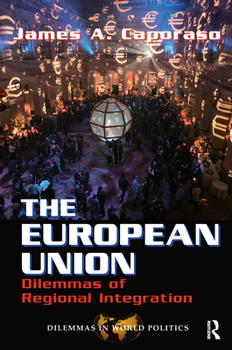The European Union: Dilemmas of Regional Integration
(Part of the Dilemmas in World Politics Series)
Select Format
Select Condition 
Book Overview
The European Union: Dilemmas of Regional Integration is a readable, informative volume for students and instructors of introductory and intermediate courses in international relations and comparative politics. Since the daily activities of the European Union cut across the comparative/IR distinction, the book will prove useful in both courses.Capor
Format:Hardcover
Language:English
ISBN:0367318466
ISBN13:9780367318468
Release Date:September 2019
Publisher:Routledge
Length:168 Pages
Weight:1.15 lbs.
Dimensions:0.6" x 6.1" x 9.1"
Customer Reviews
1 rating
Book Review: The European Union
Published by Thriftbooks.com User , 22 years ago
In his book, The European Union, James A. Caporaso addresses three salient issues facing the European Union (EU) with a mixture of both pessimism and optimism, which makes his work truly realistic and powerful. These three issues are social policy, democracy and economics, and EU external relations. Furthermore, he augments these issues by weaving in a unique blend of current international relations theory, economic cost/ benefit analysis, negotiating, and national sovereignty. Additionally, he address complex issues such as the role of the European Parliament, European Court of Justice (ECJ), the Common Foreign and Security Policy (CSFP), and various treaties and agreements in such a way that a novice could understand them- one of his stated goals. Finally, he weaves in the work of other notable authors in such a manner, that their writings are better understood, within the context of the EU, such as David Mitrany and, especially, Andrew Moravcsik.First, Caporaso's work on EU social policy is truly fascinating. Through the analysis of case studies, he shows that the EU has made some headway in improving social policy, but still has a long way to go. Surprisingly, this headway has been made in the legal arena through the ECJ. Caporaso demonstrates that perhaps of all the EU supra-national institutions, the ECJ has the most authority in impinging on national sovereignty, and having its decisions upheld, even though they are counter to national decisions or consensus. This is truly unique, as this authority is somewhat soft, but EU members respect it out of the fear of being perceived as "illegal," for lack of a better word.Second, the chapter on democracy and economics is remarkable for its ease of understanding. In this chapter, Caporaso demonstrates that democracy and economics are not necessarily mutually inclusive- in that economic policy and practice are not always necessarily implemented for the benefit of the majority of EU's citizens. Instead, he demonstrates that the EU's economic policies and practices are implemented largely for trade enhancement and thus for the benefit of corporations and/or national special interest. Finally, he proves that the "gap between [economic/democratic] power balance that exists at the national level and the corresponding institutional balance at the European level is wide and shows only modest signs of closing." Third, in the chapter on EU external relations, Caporaso very eruditely and concisely makes his point about CFSP being largely ineffectual due to qualified majority voting and national sovereignty. He points out that the EU as a whole has the capacity to form a very formidable military machine, but each member nation must concur to provide forces as well as cooperate in fields such as intelligence gathering, military industrial production, and deployment of forces. Therefore, an effective CFSP is a long way off or perhaps not foreseeable without outside prompting from a major crises or





